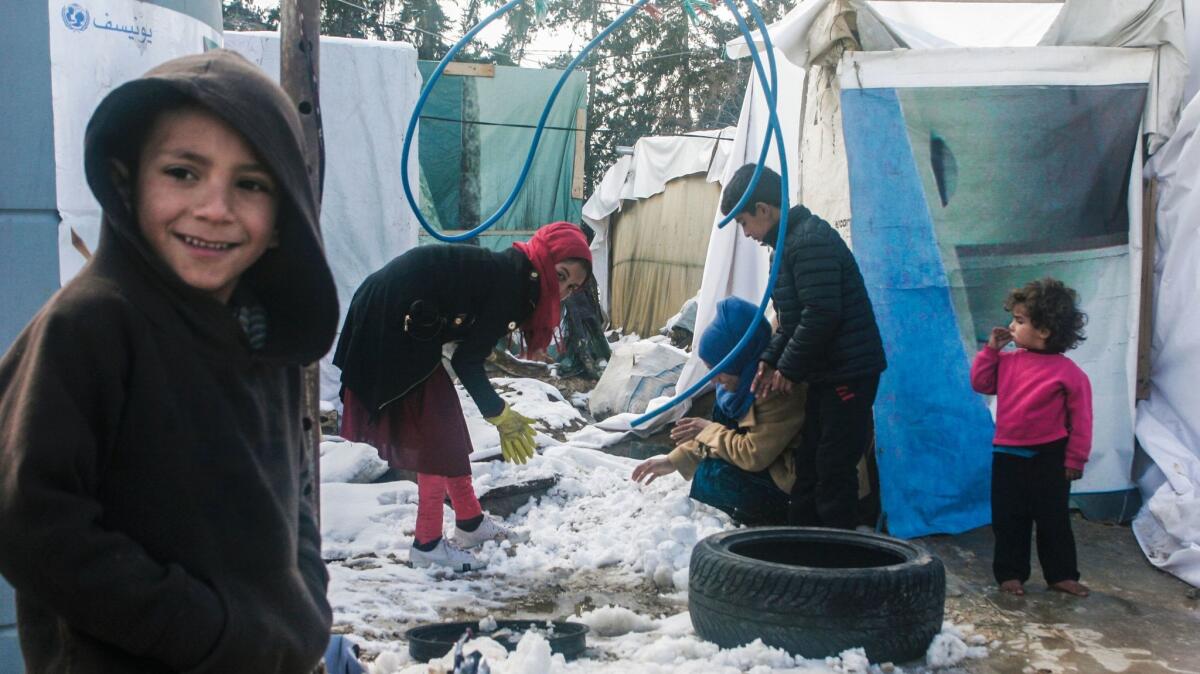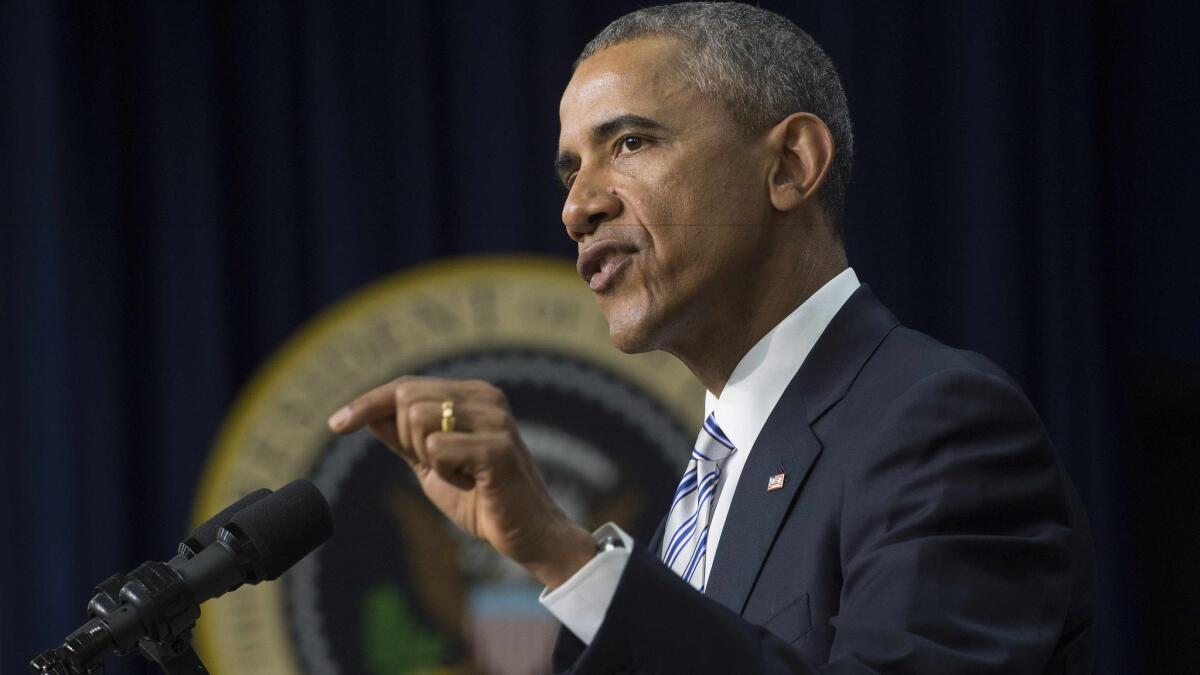Here’s one way of fighting terrorism that the U.S. may be rethinking under Trump

- Share via
Fneideq, Lebanon — On a warm day in late fall, hundreds of children, parents and local dignitaries streamed into a once-empty lot in a small town in the mountains of northern Lebanon to celebrate the inauguration of a new park and playground.
Children jostled in an unruly semblance of a line to go down one of the giant inflatable slides brought in for the occasion. Performers dressed as clowns and Winnie the Pooh wove among mothers in hijabs.
“There was nothing for families to do here before,” said Ali Salah Eddine, head of the local nonprofit, Jeel al Amal, or Generation Hope, which spearheaded the project in the town of Fneideq. “Now the whole family can come and bring their children.”
A banner hanging from the half-finished cinder block building next to the park announced that the project was paid for by the United States Agency for International Development.
The project was part of a strategy that the U.S. and other wealthy countries have turned to increasingly in recent years: using development aid as a means to prevent terrorism and violent extremism. The future of that approach is now in question under the Trump administration, which has proposed sharp cuts in foreign aid programs generally.

In early 2015, then-President Obama convened a gathering on “countering violent extremism” with officials from more than 60 countries.
“When people — especially young people — feel entirely trapped in impoverished communities, where there is no order and no path for advancement, where there are no educational opportunities, where there are no ways to support families, and no escape from injustice and the humiliations of corruption — that feeds instability and disorder, and makes those communities ripe for extremist recruitment,” Obama told the gathering.
Last year, then-United Nations Secretary-General Ban Ki-moon presented a plan for preventing violent extremism, which noted that the problem “has reached a level of threat and sophistication that requires concerted action beyond law enforcement, military or security measures to address development, good governance, human rights and humanitarian concerns.”
The amount of money the U.S. has devoted to development-based counterterrorism programs is dwarfed by the amount spent on military operations. Of the $1.6 trillion spent fighting terrorism from 2001 to 2014, 6% went to foreign aid and diplomacy, according to a Congressional Research Service report.
USAID’s Office of Transition Initiatives, which carries out development projects in conflict-prone areas — including the park in Fneideq — had a budget of $67 million last year for operations in 13 countries.
Still, the amount devoted to “soft” counterterrorism has been growing. The Obama administration requested $187 million in the 2017 budget for the State Department to counter violent extremism, more than double the amount in the 2015 budget.
Daniel Aldrich, a professor of political science at Northeastern University who evaluated USAID programs aimed at preventing violent extremism in Mali, called the development-based approach promising, but not straightforward.
“I think for a while, USAID envisioned these programs as kind of a silver bullet …and I think what we found was a little more subtle,” he said.
One issue, Aldrich said, is that it’s difficult to measure the success of counterterrorism programs in general.
“How do we measure what hasn’t happened?” he said.
U.S. Ambassador to Lebanon Elizabeth H. Richard acknowledged that difficulty, but pointed to the relative calm that has prevailed in Lebanon amid the potentially explosive circumstances of the past few years as a marker of success.
“The fact that the situation in Lebanon hasn’t resulted in serious instability as a result of the refugee crisis is due in large part to the efforts of the international community to help Lebanon meet this challenge,” she said.
Lebanon has seen an influx of development money in recent years from the U.S. and other wealthy countries concerned about tamping down a potential spread of the violence from neighboring Syria.
The country of about 6 million people is hosting more than 1 million Syrian refugees, a situation that “has exacerbated long-standing internal sectarian tensions and created new divisions,” according to a statement from the Office of Transition Initiatives.
Lebanon fought a bitter civil war of its own from 1975 to 1990, which led to an extended occupation of the country by Syrian forces. While the Lebanese civil war was largely a conflict between Muslims and Christians, in recent years, sectarian tensions in Lebanon have flared primarily between different Muslim groups, exacerbated by political divisions over the war in Syria.
The powerful Shiite political party and militia Hezbollah — regarded as a terrorist organization by the United States — has sent fighters to support the regime of Bashar Assad in Syria. Meanwhile, Sunni fighters from Lebanon have gone to join the largely Sunni rebels fighting the Syrian regime — including, in some cases, extremist groups such as Islamic State.
Last year, USAID spent $110 million on a range of programs in Lebanon, not all focused on preventing extremism. Projects have included water system improvements in areas where refugees have competed with host communities for resources; solar lighting on roads in areas with security concerns; and a Christmas food market in the city of Tripoli, which saw outbreaks of sectarian fighting in recent years spurred by tensions over the war in Syria.
Countries including Britain, France and Denmark have funded or are exploring their own programs aimed at using development dollars to counter extremism. And the United Nations Development Program spent more than $50 million last year on projects aimed at helping Lebanese host communities cope with the influx of refugees.
Fneideq is a primarily Sunni town in a remote area largely neglected by the central government, and hosts a substantial population of Syrian refugees. (Depending on the regional accent, it’s pronounced either FNAY-dek or FNAY-de’)
With few local employment opportunities, outside of the apple orchards that surround the town, Fneideq is known in the area as a recruiting ground for the Lebanese army. In 2014, a Lebanese army soldier from Fneideq was captured and beheaded by the Islamic State while fighting on Lebanon’s eastern border.
But the town is also a recruiting ground for militant groups in Syria. In 2015, the son of Fneideq’s then-mayor died fighting alongside the Islamic State in Iraq. His father told reporters on national television, “I take pride in the martyrdom of my son.”
Salah Eddine said he believes programs such as the park and the youth classes his organization runs can help dissuade young people from joining extremist groups.
But Liat Shetret, a senior adviser with the Global Center on Cooperative Security, said that while infrastructure projects like the park can help bring communities together, they don’t necessarily help counter extremism.
“I predominantly see it as a political opener and a trust-building mechanism, because that same playground could just as easily be used for recruitment purposes,” she said.
Still, Shetret said there has been a growing consensus among policymakers in recent years that “economic development and security go hand in hand.”
That consensus may be on shaky ground under the Trump administration.
President Trump questioned the value of foreign aid while on the campaign trail, and the White House last week proposed deep cuts in the State Department budget to help pay for increases in military spending. The president did not specify which foreign aid programs would be on the chopping block.
Trump’s new head of the Office of Management and Budget, Mick Mulvaney, said Saturday on Fox News that the administration planned “fairly dramatic reductions” in foreign aid, but did not specify which programs would be cut.
The proposed cuts drew immediate criticism from congressional Republicans as well as Democrats.
Since Trump took office, his administration has also reportedly discussed restructuring the “countering violent extremism” program and renaming it something like “countering Islamic extremism.”
The White House would not comment on the record to The Times about the potential name change and future funding of development programs aimed at countering violent extremism.
James Carafano, an analyst on security and foreign policy with the conservative Heritage Foundation who served on Trump’s transition team, said he does not know the administration’s plans for programs to counter extremism abroad. But he expressed skepticism about them.
“I have issues with the efficacy of a lot of these programs, whether they’re actually producing results that are measurable, and with the scale,” he said. “I personally would be OK with cutting a lot of them.”
State Department spokeswoman Rhonda Shore, asked about the future funding and direction of the countering violent extremism programs, said only that the budget for this year “has not yet been determined, so any comment about it would be premature.”
Sewell is a special correspondent.
More to Read
Sign up for Essential California
The most important California stories and recommendations in your inbox every morning.
You may occasionally receive promotional content from the Los Angeles Times.











